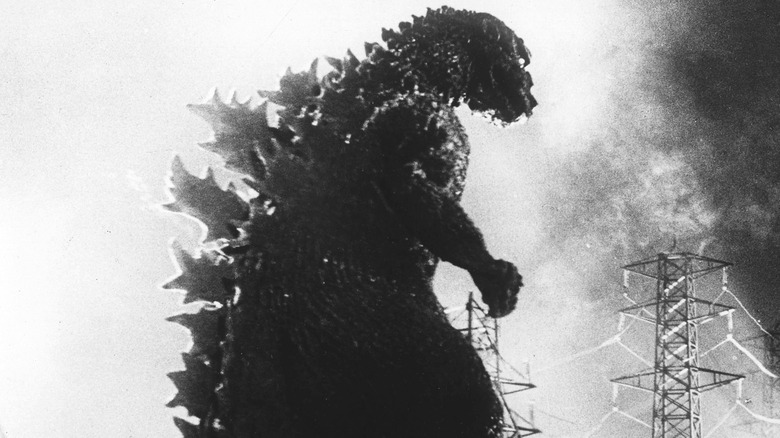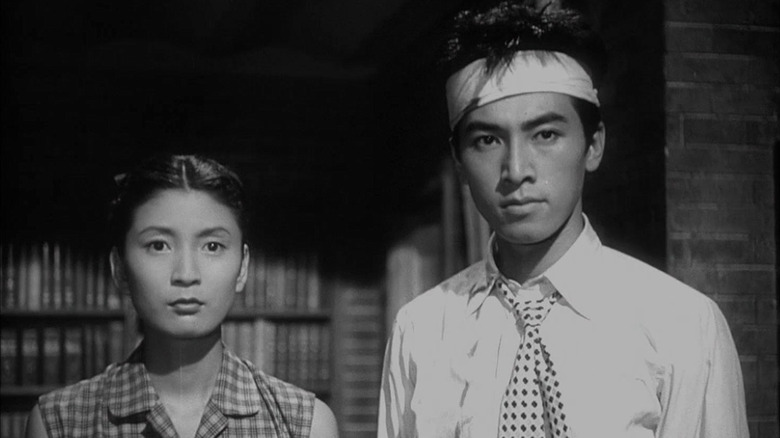The Reaction To Godzilla's Premiere Wasn't Terror – It Was Tears
There are few genre movies of any kind that can claim to have the level of influence that 1954's "Godzilla" had. Directed by Ishiro Honda, the kaiju classic was made as a response to the tragedy of the atomic bomb that Japan faced in World War II scarcely a decade earlier. The wounds were still fresh for the country at the time and, in that way, it's tough for modern audiences to truly view the film through the same lens as when it first came out, particularly those of us who aren't Japanese. But that's precisely why it was met with such an emotional response out of the gate.
2021's LIFE Godzilla did a deep dive on the "Godzilla" franchise and looked back at the original film that started it all. Stunt man Haruo Nakajima was in the audience for the film's premiere and he offered a bit of context to help modern viewers understand what it was like watching the King of the Monsters level Japan in '54. To put it mildly, it was a radically different experience than, say, watching "Godzilla vs. Kong" in 2021:
"At the opening, I sat with my back to the screen and watched the look of amazement on the faces of the audience. What I saw was fascinating. The children in the audience were jabbering during an early scene when the scientist is talking; but then, suddenly, there is the thunderous sound that marks Godzilla's arrival, and I saw the children's eyes light up, every one of them. It was so marvelous for me to see that reaction that I broke out in tears."
We've had 70 years of "Godzilla" movies at this point and, to put it mildly, visual effects have come a long way since 1954. But at that time, this was a monumental achievement in filmmaking, as well as one that came with some serious emotional resonance.
1954's Godzilla was cathartic for the people of Japan
This wasn't the "Godzilla is sort of a hero" film or one of the campy monster romps that would come later in other entries. In that original harrowing piece of cinema, he is a straight-up terrifying force of nature that seemingly can't be stopped. The only thing that has come close to capturing that same vibe is 2023's Oscar-winning "Godzilla Minus One."
It's important to understand the context of how Godzilla was portrayed in this movie (along with the timeline of events). William Tsutsui, author of "Godzilla on My Mind: Fifty Years of the King of Monsters," laid it out pretty succinctly:
"Japan was less than 10 years away from two atomic bombings, with almost 90 of its major cities having been reduced to rubble by conventional American bombing. Now imagine the Japanese audience seeing a giant monster come out of the ocean because of nuclear blasts and destroy civilization all over again. For today's viewers, it's hard to imagine seeing the film and leaving in tears not of laughter but of profound trauma and sadness, but I've talked to people who saw it then, and it was a gut-wrenching experience. And yet it was also cathartic in many ways. It captured in a very accessible, visceral way something that no charts or graphs or statistics could ever show."
Maybe not all of the critics of the day understood "Godzilla" when it came out, but it has earned its place in cinema history for this reason. While certain entries in the franchise, such as "All Monsters Attack," are flat-out silly, this remains a harrowing allegory for one of humanity's greatest atrocities. That allowed an emotional release for audiences at the time. At their best, movies can be both entertaining and meaningful. It's safe to say that this kaiju classic qualifies.

